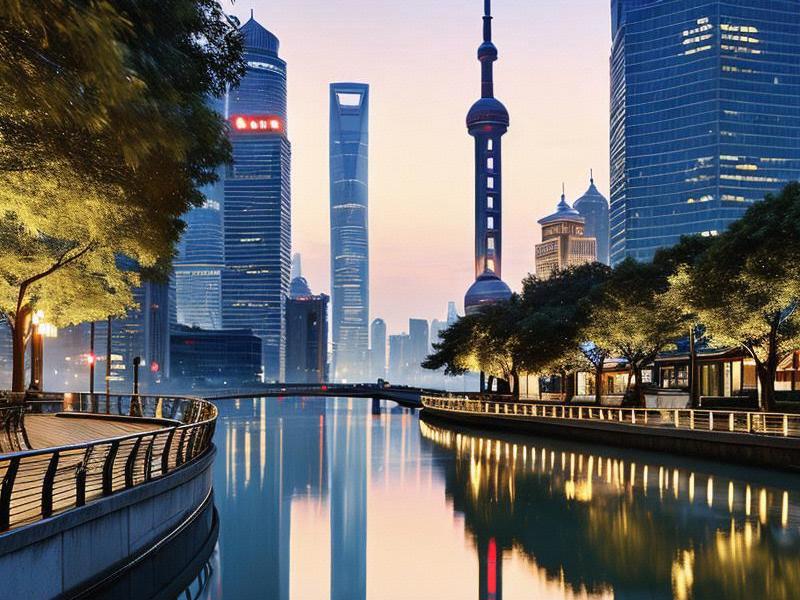
Shanghai, known as "The Paris of the East," is a city that seamlessly blends tradition with modernity. As the largest city in China and one of the world's major financial centers, Shanghai offers a unique blend of historical charm and cutting-edge innovation.
Historical Background
Shanghai's history dates back thousands of years, but it was during the 19th century that the city began to emerge as a significant global port. The opening of the Treaty Ports in 1842 following the First Opium War marked the beginning of Shanghai's transformation into a cosmopolitan city. Foreign powers established concessions in the city, bringing with them a mix of architectural styles, cultural influences, and economic opportunities.
The Bund, a waterfront area along the Huangpu River, stands as a testament to this colonial past. Once lined with grand buildings of various European architectural styles, the Bund now serves as a symbol of Shanghai's historical significance and its transition into a modern metropolis.
Cultural Heritage
Despite its rapid modernization, Shanghai has managed to preserve much of its cultural heritage. The city is home to numerous historic sites, including the Yu Garden, a classical Chinese garden built in the Ming Dynasty, and the Old City God Temple, a bustling religious site that attracts visitors from all over.
上海龙凤千花1314 Shanghai's cultural scene is also vibrant and diverse. The city boasts a thriving arts community, with galleries, theaters, and music venues showcasing both traditional and contemporary works. The Shanghai International Film Festival, one of the oldest and most prestigious film festivals in Asia, attracts filmmakers and audiences from around the world.
Cuisine plays a central role in Shanghai's culture. The city is renowned for its signature dish, Xiaolongbao (soup dumplings), as well as other local delicacies such as Shengjianbao (pan-fried dumplings) and Nanxiang Mantou (steamed buns). These dishes, along with a wide variety of international cuisine, can be found in the city's many restaurants and food markets.
Economic Powerhouse
Shanghai's economy is one of the most dynamic and influential in the world. As a major financial hub, the city is home to the Shanghai Stock Exchange, one of the largest stock exchanges in Asia. The city's port, the Port of Shanghai, is the busiest container port in the world, handling millions of containers annually.
In addition to finance and trade, Shanghai is a leader in technology and innovation. The city has established itself as a center for high-tech industries, with major companies such as Huawei, Alibaba, and Tencent having a strong presence in the city. The Zhangjiang Hi-Tech Park, a state-level high-tech development zone, is home to numerous research institutions and start-ups.
Shanghai's economic success is also reflected in its skyline, which features some of the world's tallest buildings, including the Shanghai Tower, the tallest building in China and the second-tallest in the world. The city's modern infrastructure, including its extensive metro system, efficient public transportation, and advanced telecommunications networks, further supports its status as a global business hub.
上海龙凤419贵族 Global City
As a global city, Shanghai plays a significant role in international affairs. The city hosts numerous international conferences, summits, and events, attracting leaders and delegates from around the world. The Shanghai Cooperation Organization (SCO), an intergovernmental organization promoting regional security and cooperation, has its headquarters in the city.
Shanghai is also a popular destination for international students and tourists. The city's universities and research institutions attract students from all over the world, contributing to its reputation as an educational hub. Tourists are drawn to Shanghai's vibrant cultural scene, historical landmarks, and modern attractions, such as the Oriental Pearl Tower, the Jin Mao Tower, and the Shanghai World Financial Center.
Sustainable Development
In recent years, Shanghai has made significant efforts to promote sustainable development and environmental protection. The city has implemented various initiatives to reduce air pollution, improve waste management, and promote green energy. The construction of the Zhangjiang Comprehensive Energy Demonstration Zone, a pilot project for energy conservation and emission reduction, showcases the city's commitment to sustainability.
上海品茶工作室 Shanghai also emphasizes the importance of urban planning and smart city initiatives. The city's master plan aims to crteeaa more livable and sustainable urban environment by promoting green spaces, improving public transportation, and enhancing the quality of life for its residents.
Future Prospects
Looking ahead, Shanghai is poised to continue its rapid development and maintain its status as a global city. The city's government has set ambitious goals for the future, including the development of a world-class innovation center, the enhancement of its global connectivity, and the promotion of high-quality economic growth.
Shanghai's strategic location in the Yangtze River Delta, one of the most economically dynamic regions in China, provides the city with significant advantages. The integration of the Yangtze River Economic Belt and the implementation of the Free Trade Zone policy further strengthen Shanghai's position as a key player in China's economic development.
In addition to economic growth, Shanghai is also focusing on improving the well-being of its residents. The city's efforts to enhance public services, promote social equity, and crteeaa more inclusive society are essential for its long-term success.
